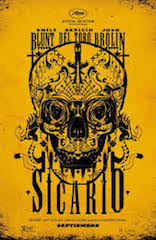On this episode of the Reel World Theology Podcast:
 We bring in a Canadian to help us chat about a Canadian directed film that deals with the complete opposite side of America’s borders. If that isn’t enough, this film has left audiences stunned– or at least deeply contemplative– when leaving the theater. It’s weighty themes of good v evil and right v wrong have made us stop and consider human nature in ways that few films this year have. We dive in while not forsaking conversations about some incredible performances and some unforgettable cinematography.
We bring in a Canadian to help us chat about a Canadian directed film that deals with the complete opposite side of America’s borders. If that isn’t enough, this film has left audiences stunned– or at least deeply contemplative– when leaving the theater. It’s weighty themes of good v evil and right v wrong have made us stop and consider human nature in ways that few films this year have. We dive in while not forsaking conversations about some incredible performances and some unforgettable cinematography.
Download Episode 076 Here:
Reel World Theology #076 – Sicario and Standing Up to Evil
Reel World Theology on Stitcher
Reel World Theology on FeedBurner
This weeks’ panel included Laura Fissel and Steve Norton.
Laura Fissel (@laura_fissel)
www.laurafissel.com
Who-ology
Steve Norton (@PastorStevePBC)
Screen Fish
Podcast Notes and Links:
[youtube url=”https://youtu.be/7XLQ1bkSLDo”]
Sicario at IMDB
Sicario at Rotten Tomatoes
Sicario Review at Reel World Theology
Sicario Review at Reel Spirituality
Sicario Review at Reel-Gospel
Sicario Review at ScreenFish
Sicario Review at Christianity Today
Zealots of Violence: Sicario Creates a World That’s Thrilling, Dark, and Our Own at Christ and Pop Culture

I’m glad you guys spent some time on the Mexican cop, Silvio, and his family. Mikey, I felt a lot like you did throughout the movie. Like the peel always to his family were somewhat useless and distracting. But the final scene was the payoff for me. (Spoilers) When the kids, Silvio’s son among them, are playing soccer and hear the gunshots in the distance they all stop, stare for a moment, then get back to playing. This is everyday life for them, they’re used to it, it’s a cycle of violence they have grown somewhat callous to precisely because of the decisions their parents (usually fathers) and leaders have always made. So these children are left with this type of example of how society works, then they’re often left fatherless as a consequence of this type of society. The system is left with nothing to do but repeat each generation and potentially get worse save some divine intervention. So I felt like what that final scene invoked made it worth the few times we cut to Silvio’s family.
This one is something that hadn’t even occurred to me until I was listening to you guys talk about Macer’s decision to sign the agreement. I think comparing her to Silvio can reveal a TON about the lengths we’re willing to go to accomplish something good or right, and to accomplish something corrupt or evil. By comparison, Macer had little to lose. Divorced, no children, living in an apartment, already experiences threats to her life. I don’t mean that to belittle her status, but for her to choose to tell the truth and keep to her principles wasn’t nearly as costly as it was to Silvio to be corrupt. He had a wife and a son to care for, yet he risked contributing to the problem and being corrupt to (presumably) make more money for them. His resolve was so strong that he was willing to turn to ruthless criminals pedaling drugs and supporting the very industry that kept his city one of the most violent in the country. Yet Macer was not willing to sacrifice herself for the truth. Sure, she’s risking her life directly, but Silvio’s role had the potential to be equally as dangerous. Anyway, that just hit me a lot; the lengths at which our protagonist was willing to go to expose the truth vs the lengths that Silvio went to in becoming part of the problem.